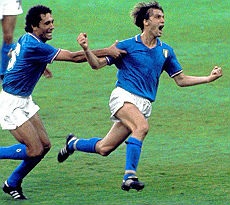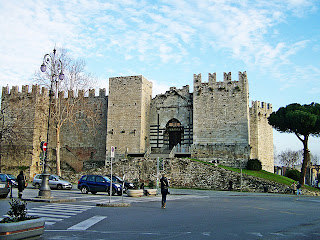Joyous celebration lasting image of Italy's 1982 World Cup win
 |
| Marco Tardelli loses himself in his joy after scoring in the 1982 World Cup final |
The midfield player, who spent much of his club career with one of the best Juventus teams of all time, ran to the Italian bench after his goal against West Germany gave the Azzurri a 2-0 lead, clenching both fists in front of his chest, tears flowing as he shook his head from side to side and repeatedly shouted "Gol! Gol!" in what became known as the Tardelli Scream.
Italy went on to complete a 3-1 win over the Germans in the Santiago Bernabéu Stadium in Madrid with Paolo Rossi and Antonio Altobelli scoring Italy's other goals. Tardelli, who was part of Italy's squad for three World Cups, had earlier scored against Argentina in the second group phase.
Tardelli later said that he felt he "was born with that scream inside me" and its release was sparked by the sheer joy at realising a dream he had nurtured since he was a child, of scoring in the final of a World Cup.
It meant that when he retired as a player in 1988 he could look back on winning international football's greatest prize as well as every competition in which he participated in club football.
During his career with Juventus, whom he joined in 1975 and left after 11 seasons, the Turin team won the Scudetto - the Serie A title - five times, the Coppa Italia twice, plus the UEFA Cup, the Cup-Winners' Cup and the European Cup, as well as the UEFA Super Cup.
Relive Marco Tardelli's goal and celebration from the 1982 World Cup final
He and his Juventus team-mates Antonio Cabrini and Gaetano Scirea were the first three players in football history to have collected winners' medals for all three major European club competitions. His goal in the first leg of the 1977 UEFA Cup final against Athletic Bilbao helped Juventus win their first European title.
Tardelli was born in the tiny village of Capanne di Careggine, in the mountainous Garfagnana area of northern Tuscany. The village has between 500 and 600 residents.
He began his career with Pisa, then in Serie C, moved next to Serie B club Como and joined Juventus in 1975. He went on to play 376 matches for Juventus, scoring 51 goals, before moving to Internazionale in 1985, spending two seasons in Milan before completing his playing career with a season in Switzerland, playing for St Gallen.
Called up for the national team in 1976, he won 81 international caps and scored six goals, captaining his country between 1983 and 1985.
During an era when Italian football was heavily defensive, Tardelli stood out for his versatility, a hard-tackling yet technically skilful and elegant defensive midfielder, with an ability to contribute in attack too. He could play anywhere in midfield or defence but was also blessed with accurate passing ability with both feet and a powerful shot.
Tactically intelligent, it was inevitable he would move into coaching. Indeed, he was hired by the Italian Football Federation as soon as he retired as a player.
Appointed as head coach of the Under-16 Italian national team in 1988, he quickly graduated to assistant Under-21 coach under Cesare Maldini before trying his hand in club football with Como, with whom he won promotion to Serie B.
 |
| Marco Tardelli and Giovanni Trapattoni during their time in charge of the Republic of Ireland national team |
His return to club football with Internazionale ended after one season, a string of embarrassing defeats culminating in a 6-0 defeat to local rivals AC Milan. Tardelli was fired in June 2001 and spells with Bari, the Egyptian national team and Arezzo brought no success.
He then spent five years working alongside Giovanni Trapattoni as assistant manager of the Republic of Ireland national team. The pair took the Irish team to the finals of Euro 2012 but were dismissed after failing to qualify for the 2014 World Cup and Tardelli has worked largely as a pundit since then. He has recently published an autobiography, Tutto o niente: La mia storia (All or Nothing: My Story).
 |
| The Church of San Pietro in Careggine |
Careggine stands on a plateau offering stunning views of the strikingly beautiful Monte Pisanino and the valley it overlooks. The parish Church of St Peter, founded in 720, still conserves parts of its original medieval structure, including the bell tower, despite damage suffered in an earthquake in 1920.
Travel tip:
The Garfagnana is the mountainous area around the Serchio valley north of the walled city of Lucca. Its heavy annual rainfall means that the lower mountain slopes have a lush covering of dense woodland, mainly sweet chestnut trees. The main towns are Castelnuovo di Garfagnana, home to the impressive Rocca Ariostesca (Ariosto's Castle), and Barga, which is famous for its annual opera and jazz festivals. Barga was once dubbed "the most Scottish town in Italy" because its surrounding countryside bears similarities with the Scottish Highlands and has twinned with no fewer than four towns in Scotland.
More reading
Paolo Rossi's World Cup hat-trick marks redemption
Marcello Lippi - World Cup winning coach
A fourth World Cup for the Azzurri
(Photo of Marco Tardelli and Trapattoni by Michael Cranewitter CC BY-SA 3.0)
(Photo of Careggine church by Davide Papalini CC BY-SA 3.0)
Home


